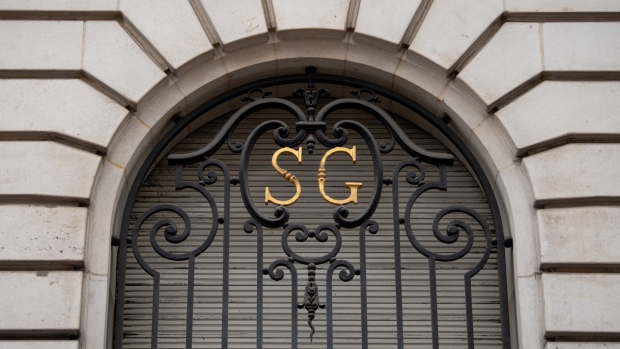Feb 8, 2024
SocGen’s Krupa Vows Growth After Year Marred by Wrong-Way Hedges
, Bloomberg News

(Bloomberg) -- Societe Generale SA vowed to increase revenue by at least 5% this year as the impact of wrong-way interest rate hedges starts to fade and Chief Executive Officer Slawomir Krupa simplifies the lender.
The Paris-based bank announced the target on Thursday, after reporting a 9.9% drop in the top line and 60% lower profit for the fourth quarter, driven by weaker income from retail banking in France and a slump in fixed income trading. Equities trading jumped.
SocGen will return about €1 billion to shareholders, equal to about 40% of last year’s profit. That’s at the lower end of the range the lender has promised.
Krupa, a former investment banker who took over last year with a mandate to boost the shares, has been struggling to win back investors after a strategy update that disappointed markets. He unveiled a plan this month to cut about 900 head office jobs, but progress on disposals to simplify the company has been slow. Wrong-way interest rate hedges put in place under his predecessor, meanwhile, were expected to erase some €1.6 billion euros in revenue last year alone.
“2023 was a year of transition and transformation,” Krupa said in a statement which also noted that the worst impact of the bad hedges was over, and that net interest income was starting to recover.
Shares of SocGen swung between gains and losses, rising 0.5% at 10:25 a.m. in Paris. They have lost about 16% of their value over the past 12 months, even as an index of European banks rose.
Krupa’s mid-term targets, unveiled in September, included lower mid-term ambitions for profitability and revenue, with the latter expected to increase between 0% and 2% on average per year. But after last year’s almost 8% decline in the top line, the pressure is on for growth this year.
In addition to the revenue target for this year, SocGen also set a goal for a return on tangible equity — a measure of profitability — of more than 6%. The metric stood at 1.7% in the fourth quarter.
Revenue from retail banking in its home market fell 14% from a year earlier, though SocGen said it anticipates its net interest revenue to rebound this year. The business has suffered after the bank in late 2021 and early 2022 took out protection for its interest income, as it expected the European Central Bank to keep interest rates low. That bet proved ill-timed when the ECB shortly after set out on an unprecedented sequence of interest rate increases.
Another drag on revenue was the car-leasing business Ayvens, formerly known as ALD, a unit that was considered a priority for the bank by Krupa’s predecessor Frederic Oudea. In the fourth quarter, the unit saw its revenue slide 17%, in part because of a roughly €150-million hit from the mark-to-market value of its hedging portfolio on leasing contracts.
At the investment bank, fixed income trading declined 22%, worse than the 9.7% decline across Wall Street’s biggest banks. Equities trading rose 18% from a year earlier, better than at US peers, helped by strong demand for derivatives.
Krupa said the firm’s exposure to commercial real estate in the US was “marginal,” after troubles in the US property market started to affect some other, smaller lenders in Europe. SocGen had about €4 billion euros in exposure at default to such assets, according to a presentation.
Krupa has also pledged a €1.7 billion in cost reduction by 2026 as part of his strategy update. To get there, he is seeking to dispose of various assets, including custodian business SGSS, equipment finance unit SGEF, as well as Germany’s Hanseatic Bank and UK’s Kleinwort Hambros.
The bank’s cost-to-income ratio, which the CEO aims to bring below 60% by 2026, stood at 78% in the fourth quarter, underlining the challenges.
(Adds context on hedges in ninth paragraph.)
©2024 Bloomberg L.P.






